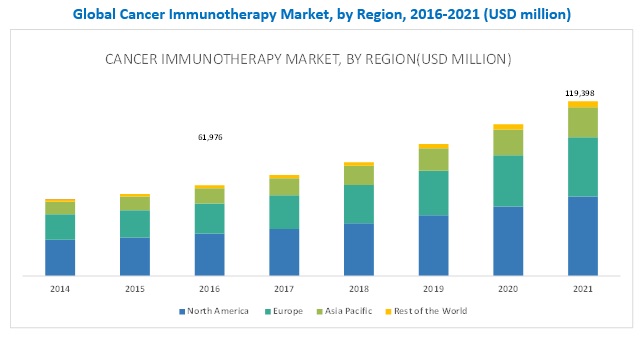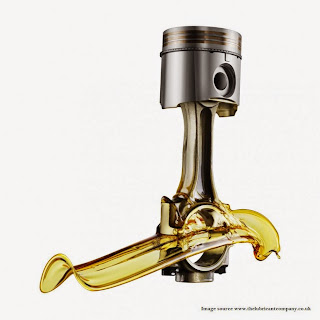Cancer Immunotherapy Market - Top Players and Business Growth Strategies
According to research report Cancer Immunotherapy Market
is expected to reach USD 119.39 Billion by 2021 from USD 61.97 Billion
in 2016, at a CAGR of 14.0% from 2016 to 2021. This report provides a
detailed overview of the major drivers, restraints, challenges,
opportunities, current market trends, and strategies impacting the
global cancer immunotherapy market along with the estimates and
forecasts of the revenue and market share analysis.
Cancer immunotherapy drugs are designed to alter or boost the body’s natural immune response to fight cancer this market is research-driven with a high degree of dependence on the discovery of molecules that can generate an immune response against various indications.
Download PDF Brochure: https://www.marketsandmarkets.com/pdfdownloadNew.asp?id=197577894
The cancer immunotherapy market has been segmented, on the basis of product into monoclonal antibodies, immunomodulators, vaccines, and check point inhibitors. The check point inhibitors segment is estimated to witness the highest CAGR during 2016-2021. The high growth can be attributed to the benefits offered by this therapeutic drug.
The global cancer immunotherapy market is consolidated in nature, marked with the presence of a few large players. The prominent players in this market are Amgen (U.S.), AstraZeneca (U.K.), F. Hoffmann-La Roche Ltd(Switzerland), Bayer AG (Germany), Bristol-Myers Squibb (U.S.), Eli Lilly and Company (U.S.), Janssen Global Services, LLC (Belgium), Merck (U.S.), Novartis (Switzerland), and Pfizer (U.S.).
Amgen was the largest player in the global cancer immunotherapy market in 2015. The company has a strong presence in the U.S., Europe, Asia-Pacific, the Middle East, and Africa. In order to sustain its foothold and further increase its share in the market, the company pursues the strategy of new product launches, which significantly impacts the companys customer base.
In 2015, F. Hoffmann-La Roche AG accounted for the second-largest share in the cancer immunotherapy market. The company focuses on developing innovative products to provide efficient solutions to its customers.
Get Report Sample: https://www.marketsandmarkets.com/requestsampleNew.asp?id=197577894
Bristol-Myers Squibb (BMS) held the third position in the cancer immunotherapy market in 2015. The company has a first-mover advantage as two of its drugs (Opdivo and Yervoy) have already been approved and commercialized. These products recently received an approval of oncolytic virus Imlygic and cancer vaccine Empliciti from the U.S. FDA.
The key strategies followed by most companies in the cancer immunotherapy market are new products launches and approvals; expansions; acquisitions; and partnerships, agreements, and collaborations. The strategy of new products launches and approvals accounted for the largest share of the overall growth strategies mapped from 2013 to 2016. Companies seek new and advanced product approvals to strengthen their product portfolios and cater to the unmet needs of their customers. Some of the leading players that adopted this strategy include Amgen (U.S.), F. Hoffmann-La Roche Ltd. (Switzerland), Bristol-Myers Squibb (U.S.), and Merck (U.S.).
Cancer immunotherapy drugs are designed to alter or boost the body’s natural immune response to fight cancer this market is research-driven with a high degree of dependence on the discovery of molecules that can generate an immune response against various indications.
Download PDF Brochure: https://www.marketsandmarkets.com/pdfdownloadNew.asp?id=197577894
The cancer immunotherapy market has been segmented, on the basis of product into monoclonal antibodies, immunomodulators, vaccines, and check point inhibitors. The check point inhibitors segment is estimated to witness the highest CAGR during 2016-2021. The high growth can be attributed to the benefits offered by this therapeutic drug.
The global cancer immunotherapy market is consolidated in nature, marked with the presence of a few large players. The prominent players in this market are Amgen (U.S.), AstraZeneca (U.K.), F. Hoffmann-La Roche Ltd(Switzerland), Bayer AG (Germany), Bristol-Myers Squibb (U.S.), Eli Lilly and Company (U.S.), Janssen Global Services, LLC (Belgium), Merck (U.S.), Novartis (Switzerland), and Pfizer (U.S.).
Amgen was the largest player in the global cancer immunotherapy market in 2015. The company has a strong presence in the U.S., Europe, Asia-Pacific, the Middle East, and Africa. In order to sustain its foothold and further increase its share in the market, the company pursues the strategy of new product launches, which significantly impacts the companys customer base.
In 2015, F. Hoffmann-La Roche AG accounted for the second-largest share in the cancer immunotherapy market. The company focuses on developing innovative products to provide efficient solutions to its customers.
Get Report Sample: https://www.marketsandmarkets.com/requestsampleNew.asp?id=197577894
Bristol-Myers Squibb (BMS) held the third position in the cancer immunotherapy market in 2015. The company has a first-mover advantage as two of its drugs (Opdivo and Yervoy) have already been approved and commercialized. These products recently received an approval of oncolytic virus Imlygic and cancer vaccine Empliciti from the U.S. FDA.
The key strategies followed by most companies in the cancer immunotherapy market are new products launches and approvals; expansions; acquisitions; and partnerships, agreements, and collaborations. The strategy of new products launches and approvals accounted for the largest share of the overall growth strategies mapped from 2013 to 2016. Companies seek new and advanced product approvals to strengthen their product portfolios and cater to the unmet needs of their customers. Some of the leading players that adopted this strategy include Amgen (U.S.), F. Hoffmann-La Roche Ltd. (Switzerland), Bristol-Myers Squibb (U.S.), and Merck (U.S.).


Comments
Post a Comment